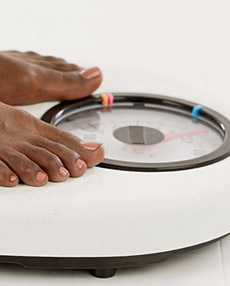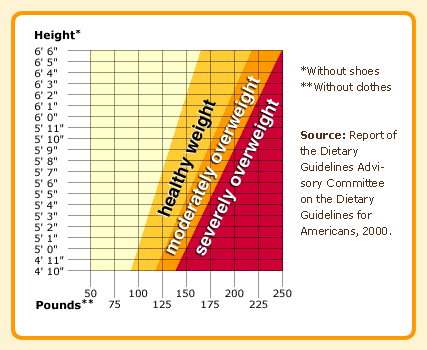| HOME | WEIGHT CONTROL | DIET & NUTRITION | LIQUID DIETS | PHYSICAL ACTIVITY | HEART HEALTH | WELLNESS | LINKS |

|
Keep a Healthy Perspective >
|
Do You Need to Lose Weight? |
|
Who should lose weight? Health experts generally agree that adults can benefit from weight loss if they are moderately to severely overweight (see the following weight-for-height chart below). Health experts also agree that adults who are overweight and have weight-related medical problems or a family history of such problems can benefit from weight loss. Some weight-related health problems include diabetes, heart disease, high blood pressure, high cholesterol levels, or high blood sugar levels. Even a small weight loss of 10 to 20 pounds can improve your health, for example by lowering your blood pressure and cholesterol levels. You do not need to lose weight if your weight is within the healthy range on the weight-for-height chart, you have gained less than 10 pounds since you reached your adult height, and you are otherwise healthy.
Your body weight is controlled by the number of calories you eat and the number of calories you use each day. So, to lose weight you need to take in fewer calories than you use. You can do this by becoming more physically active or by eating less. Following a weight-loss program that helps you to become more physically active and decrease the amount of calories that you eat is most likely to lead to successful weight loss. The weight-loss program should also help you keep the weight off by making changes in your physical activity and eating habits that you will be able to follow for the rest of your life. Types of Weight-Loss Programs To lose weight and keep it off, you should be aware of the different types of programs available and the important parts of a good program. Knowing this information should help you select or design a weight-loss program that will work for you. The three types of weight-loss programs include: do-it-yourself programs, non-clinical programs, and clinical programs. Do-It-Yourself Programs Any effort to lose weight by yourself or with a group of like-minded others through support groups, worksite or community-based programs fits in the "do-it-yourself" category. Individuals using a do-it-yourself program rely on their own judgment, group support, and products such as diet books for advice (Note: Not all diet books are reliable sources of weight-loss information). Non-Clinical Programs These programs may or may not be commercially operated, such as through a privately-owned, weight-loss chain. They often use books and pamphlets that are prepared by health-care providers. These programs use counselors (who usually are not health-care providers and may or may not have training) to provide services to you. Some programs require participants to use the program's food or supplements. Clinical Programs This type of program may or may not be commercially owned. Services are provided in a health-care setting, such as a hospital, by licensed health professionals, such as physicians, nurses, dietitians, and/or psychologists. In some clinical programs, a health professional works alone; in others, a group of health professionals works together to provide services to patients. Clinical programs may offer you services such as nutrition education, medical care, behavior change therapy, and physical activity. Clinical programs may also employ other weight-loss methods to treat severely overweight patients, including:
If you are considering a weight-loss program and you have medical problems, or if you are severely overweight, programs run by trained health professionals may be best for you. These professionals are more likely to monitor you for possible side effects of weight loss and to talk to your doctor when necessary. Whether you decide to use the do-it-yourself, non-clinical, or clinical approach, the program should help you lose weight and keep it off by teaching you healthy eating and physical activity habits that you will be able to follow for the rest of your life. |
|
